HUMAN HISTORY IS A HISTORY OF SALVATION – Psalm 126
VATICAN CITY, OCT. 12, 2011 (Zenit.org).- Here is a translation of the Italian-language catechesis Benedict XVI gave today during the general audience held in St. Peter’s Square. The Pope today continued his catecheses on prayer with a reflection on Psalm 126.
* * *
In the previous catecheses, we have meditated on a number of psalms of lament and of trust. Today, I would like to reflect with you on a notably joyous psalm, a prayer that sings with joy the marvels of God. It is Psalm 126 — according to Greco-Latin numbering, 125 — which extols the great things the Lord has done with His people, and which He continues to do with every believer.
The psalmist begins the prayer in the name of all Israel by recalling the thrilling experience of salvation:
“When the Lord restored the fortunes of Zion,
we were like those who dream.
Then our mouth was filled with laughter,
and our tongue with shouts of joy” (Verses 1-2a).
The psalm speaks of “restored fortunes”; that is, restored to their original state in all their former favorability. It begins then with a situation of suffering and of need to which God responds by bringing about salvation and restoring the man who prays to his former condition; indeed, one that is enriched and even changed for the better. This is what happens to Job, when the Lord restores to him all that he had lost, redoubling it and bestowing upon him an even greater blessing (cf. Job 42:10-13), and this is what the people of Israel experience in returning to their homeland after the Babylonian exile.
This psalm is meant to be interpreted with reference to the end of the deportation to a foreign land: The expression “restore the fortunes of Zion” is read and understood by the tradition as a “return of the prisoners of Zion.” In fact, the return from exile is paradigmatic of every divine and saving intervention, since the fall of Jerusalem and the deportation into Babylon were devastating experiences for the Chosen People, not only on the political and social planes, but also and especially on the religious and spiritual ones. The loss of their land, the end of the davidic monarchy and the destruction of the Temple appear as a denial of the divine promises, and the People of the Covenant, dispersed among the pagans, painfully question a God who seems to have abandoned them.
Therefore, the end of the deportation and their return to their homeland are experienced as a marvelous return to faith, to trust, to communion with the Lord; it is a “restoring of fortunes” that involves a conversion of heart, forgiveness, re-found friendship with God, knowledge of His mercy and a renewed possibility of praising Him (cf. Jeremiah 29:12-14; 30:18-20; 33:6-11; Ezekiel 39:25-29). It is an experience of overflowing joy, of laughter and of cries of jubilation, so beautiful that “it seems like a dream.” Divine help often takes surprising forms that surpass what man is able to imagine; hence the wonder and joy that are expressed in this psalm: “The Lord has done great things.” This is what the nations said, and it is what Israel proclaims:
“Then they said among the nations,
‘the Lord has done great things for them.’
The Lord has done great things for us;
we are glad” (Verses 2b-3).
God performs marvelous works in the history of men. In carrying out salvation, He reveals Himself
to all as the powerful and merciful Lord, a refuge for the oppressed, who does not forget the cry of the poor (cf. Psalm 9:10,13), who loves justice and right and of whose love the earth is filled (cf. Psalm 33:5). Thus, standing before the liberation of the People of Israel, all the nations recognize the great and marvelous things God has accomplished for His People, and they celebrate the Lord in His reality as Savior.
And Israel echoes the proclamation of the nations, taking it up and repeating it once more — but as the protagonist — as a direct recipient of the divine action: “The Lord has done great things for us”; “for us” or even more precisely, “with us,” in hebrew ‘immanû, thus affirming that privileged relationship that the Lord keeps with His chosen ones, and which is found in the nameEmmanuel, “God with us,” the name by which Jesus would be called, His complete and full revelation (cf. Matthew 1:23).
Dear brothers and sisters, in our prayer we should look more often at how, in the events of our own lives, the Lord has protected, guided and helped us, and we should praise Him for all He has done and does for us. We should be more attentive to the good things the Lord gives to us. We are always attentive to problems and to difficulties, and we are almost unwilling to perceive that there are beautiful things that come from the Lord. This attention, which becomes gratitude, is very important for us; it creates in us a memory for the good and it helps us also in times of darkness. God accomplishes great things, and whoever experiences this — attentive to the Lord’s goodness with an attentiveness of heart — is filled with joy. The first part of the psalm concludes on this joyous note. To be saved and to return to one’s homeland from exile are like being returned to life: Freedom opens up to laughter, but is does so together with a waiting for a fulfillment still desired and implored. This is the second part of our psalm, which continues: (more…)
Tags: catholic, catholic podcast, catholic prayer, cathollc spirituality, pope benedict xvi, prayer, psalm 126
This entry was posted on Wednesday, October 12th, 2011 at 5:48 pm
You can follow any responses to this entry through the RSS 2.0 feed.
The Novena to St. Teresa of Avila, Day 7
composed by  by St. Alphonsus of Liguori.
Join in on Day 7 [powerpress = “devotionals-prayers”]
O most loving Lord Jesus Christ! we thank Thee for the wonderful gift of the wound in the heart which Thou didst grant to Thy beloved Teresa; we pray Thee, by Thy merits, and by those of Thy seraphic spouse, to grant us also a like wound of love, that, henceforth, we may love Thee and give our mind to the love of nothing but Thee.
Say one Our Father, Hail Mary and Glory be.
V. St. Teresa, pray for us:
R. That we may become worthy of the promises of Jesus Christ.
Let us pray: Graciously hear us, O God of our salvation! that as we rejoice in the commemoration of the blessed virgin Teresa, so we may be nourished by her heavenly doctrine, and draw from thence the fervour of a tender devotion; through our Lord Jesus Christ, Thy Son, Who liveth and reigneth with Thee in the unity of the Holy Spirit, God for ever and ever. Amen.
Tags: catholic, catholic podcast, catholic prayer, cathollc spirituality, st alphonsus, st teresa
This entry was posted on Wednesday, October 12th, 2011 at 12:05 am
You can follow any responses to this entry through the RSS 2.0 feed.
The Novena to St. Teresa of Avila, Day 6
composed by  by St. Alphonsus of Liguori.
Join in on Day 6 [powerpress = “devotionals-prayers”]
O most bountiful Lord Jesus Christ! we thank Thee for the gift of devotion towards Thy sweet mother, Mary and her holy spouse, Joseph, which Thou didst grant to Thy beloved Teresa; we pray Thee, by Thy merits, and by those of Thy most dear spouse, to give us the grace of a special and tender devotion towards Thy most holy mother, Mary, and towards Thy beloved foster-father, Joseph.
Say one Our Father, Hail Mary and Glory be.
V. St. Teresa, pray for us:
R. That we may become worthy of the promises of Jesus Christ.
Let us pray: Graciously hear us, O God of our salvation! that as we rejoice in the commemoration of the blessed virgin Teresa, so we may be nourished by her heavenly doctrine, and draw from thence the fervour of a tender devotion; through our Lord Jesus Christ, Thy Son, Who liveth and reigneth with Thee in the unity of the Holy Spirit, God for ever and ever. Amen
Tags: catholic, catholic podcast, catholic prayer, cathollc spirituality, hail mary, jesus christ, Lord Jesus Christ, st teresa
This entry was posted on Wednesday, October 12th, 2011 at 12:04 am
You can follow any responses to this entry through the RSS 2.0 feed.
Show 6 – Cerebrocentric vs. Genitocentric Sexuality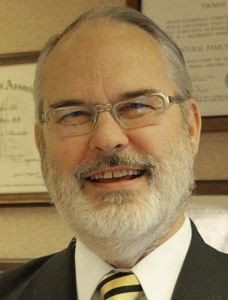
“Your Fertility Care Consultâ€
with Dr. Thomas Hilgers, founder of the Pope Paul VI Institute
for The Study of Human Reproduction
hosted by Kris McGregor
[powerpress]
listen to the entire series at Dr. Hilger’s Discerning Hearts Page
The Pope Paul VI Institute, founded in 1985 by Thomas W. Hilgers, MD, is internationally recognized for its outstanding achievements in the field of natural fertility regulation and reproductive medicine — 30 years of scientific research and educational program development; allied health professional education programs for couples and professionals; professional, caring, and morally acceptable patient services. The Pope Paul VI Institute for the Study of Human Reproduction is building a culture of life in women’s health care through its major developments — Creighton Model FertilityCare System and NaProTechnology.
Tags: catholic, catholic podcast, catholic prayer, cathollc spirituality, creighton model, pope paul vi institute, thomas hilgers, Thomas W. Hilgers, w/ Dr. Thomas Hilgers
This entry was posted on Monday, October 10th, 2011 at 9:45 am
You can follow any responses to this entry through the RSS 2.0 feed.
Episode 11- Regnum Novum: Bringing forth the New Evangelization through Catholic Social Teaching with Omar Guiterrez – Value 5 The Common Good, Universal Destination of Goods, Subsidiarity, Participation, Solidarity part 5
Social Teaching with Omar Guiterrez – Value 5 The Common Good, Universal Destination of Goods, Subsidiarity, Participation, Solidarity part 5
[powerpress]
These are the five principles laid out in the Compendium of the Social Doctrine of the Church. If we understand these principles, then the work of the Revolution can begin. We are made now for a New Kingdom with Christ as our King in all things. Let us discover this place together, and make the devil cringe and know the suffering of defeat. “Love”
Discerning Hearts is blessed to present Omar F. A. Guiterrez, M.A. , Special Assistant to Archbishop George Lucas of the Archdiocese of Omaha, in a groundbreaking series which breaks open the heart of Catholic Social Doctrine.
We encourage you to visit “Regnum Novum – A New Kingdom: A Revolution” Omar Guiterrez’s blog site
 We live at a very special time. The confluence of many things has brought forth the clear need to be able to articulate the Social Teaching of the Catholic Church in a way that is accessible and applicable. This is not to be an effort where high-minded theories are to be bandied about. Rather, this is a time of opportunity wherein we can apply the Social Doctrine to the concrete so as to bring about a New Kingdom, a Revolution. – Omar G. from Regnum Novum
We live at a very special time. The confluence of many things has brought forth the clear need to be able to articulate the Social Teaching of the Catholic Church in a way that is accessible and applicable. This is not to be an effort where high-minded theories are to be bandied about. Rather, this is a time of opportunity wherein we can apply the Social Doctrine to the concrete so as to bring about a New Kingdom, a Revolution. – Omar G. from Regnum Novum
From episode 11… Point 5: The Common Good, Universal Destination of Goods, Subsidiarity, Participation, Solidarity
These are the five principles laid out in the Compendium of the Social Doctrine of the Church. If we understand these principles, then the work of the Revolution can begin. We are made now for a New Kingdom with Christ as our King in all things. Let us discover this place together, and make the devil cringe and know the suffering of defeat.
In this episode we focus on “Solidarity”.
Also visit Omar’s “Discerning Hearts” page Catholic Social Teaching 101
Tags: catholic, catholic podcast, catholic prayer, catholic social doctrine, catholic social teaching, cathollc spirituality, Omar Guiterrez, solidarity
This entry was posted on Monday, October 10th, 2011 at 8:41 am
You can follow any responses to this entry through the RSS 2.0 feed.
Heart of Hope Part 4 – The healing hand of Christ, seeing the will of God, and how we suffer love. The tale of the two criminals on the cross next to Christ on Gologotha.
[powerpress = “deacon-james-keating”]
 Deacon James Keating, PhD, the director of Theological Formation for the Institute for Priestly Formation, located at Creighton University, in Omaha, is making available to “Discerning Hearts” and all who listen, his series of programs entitled “The Heart of Hope”.
Deacon James Keating, PhD, the director of Theological Formation for the Institute for Priestly Formation, located at Creighton University, in Omaha, is making available to “Discerning Hearts” and all who listen, his series of programs entitled “The Heart of Hope”.
This extraordinarily popular series explores the work of suffering in the Christian life and how God can use it to transform the heart of the individual and the world. 
The “Heart of Hope”  tackles a very tough subject…the gift of suffering in the Christian life. Deacon Keating guides us well.
For more information on the “Institute of Priestly Formation” and for other material available by Deacon Keating, just click here
Don’t forget to pickup a copy of “Communion with Christ” , it is one of the best audio sets on prayer…ever!
Check out Deacon Keating’s “Discerning Heart” page
Tags: catholic, catholic podcast, catholic prayer, cathollc spirituality, Deacon James Keating, Deacon Keating, institute for priestly formation, PhD, theological formation
This entry was posted on Thursday, October 6th, 2011 at 10:23 pm
You can follow any responses to this entry through the RSS 2.0 feed.
I LOVE talking with Fr. James Martin, especially about the saints!  “Between Heaven and Mirth: Why Joy,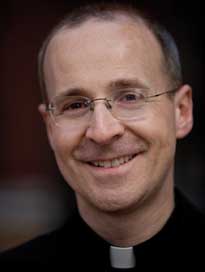 Humor, and Laughter Are at the Heart of the Spiritual Life” is fantastic! I don’t think there’s another book like it out there. Fr. Martin takes Scripture, history, the Saints, and the basics of our faith and the spiritual life, and wraps them  all together to bring us a unique and wonderful study of joy and happiness. To say it was uplifting to read would be an understatement.  Others have tried to write humorous books about the Christian faith, but often times their attempts come  off little crass and a tad tasteless….but not Fr. Jim Martin, that’s because it about joy, happiness and grace…and he leads to the well where we can find it.  [powerpress]
Humor, and Laughter Are at the Heart of the Spiritual Life” is fantastic! I don’t think there’s another book like it out there. Fr. Martin takes Scripture, history, the Saints, and the basics of our faith and the spiritual life, and wraps them  all together to bring us a unique and wonderful study of joy and happiness. To say it was uplifting to read would be an understatement.  Others have tried to write humorous books about the Christian faith, but often times their attempts come  off little crass and a tad tasteless….but not Fr. Jim Martin, that’s because it about joy, happiness and grace…and he leads to the well where we can find it.  [powerpress]
You can find the book here
Tags: catholic, catholic podcast, catholic prayer, cathollc spirituality, fr. james martin, humor, James Martin, Jim Martin, Mirth, saints
This entry was posted on Wednesday, October 5th, 2011 at 10:19 am
You can follow any responses to this entry through the RSS 2.0 feed.
 Saint Maria Faustina Kowalska –The Humble Instrument
Saint Maria Faustina Kowalska –The Humble Instrument
The article below is found on the Divine Mercy website – I highly encourage you to visit there (they are doing wonderful things)!
Sister Faustina was a young, uneducated, nun in a convent of the Congregation of Sisters of Our Lady of Mercy in Cracow, Poland during the 1930’s. She came from a very poor family that struggled on their little farm during the years of World War I. She had only three years of very simple education, so hers were the humblest tasks in the convent, usually in the kitchen or garden. However, she received extraordinary revelations or messages from Our Lord Jesus. Jesus asked Sr. Faustina to record these experiences, which she compiled in notebooks. These notebooks are known today as the Diary of Saint Maria Faustina Kowalska and the words contained within are God’s loving message of Divine Mercy. Though the Divine Mercy message is not new to the teachings of the Church, Sr. Faustina’s Diary sparked a great movement, and a strong and significant focus on the mercy of Christ. Pope John Paul II canonized Sr. Faustina in 2000 making her the “first saint of the new millennium.” Speaking of Sr. Faustina and the importance of the message contained in her Diary, the Pope call her “the great apostle of Divine Mercy in our time.” Today, we continue to rely of Saint Faustina as a constant reminder of the message to trust in Jesus’ endless mercy, and to live life mercifully toward others. We also turn to her in prayer and request her intercession to our merciful Savior on our behalf. At the National Shrine of The Divine Mercy, we include the following in our 3 o’clock prayers:
Saint Faustina,
You told us that your mission would continue after your death and that you would not forget us. Our Lord also granted you a great privilege, telling you to “distribute graces as you will, to who you will, and when you will.” Relying on this, we ask your intercession for the graces we need, especially for the intentions just mentioned. Help us, above all, to trust in Jesus as you did and thus to glorify His mercy every moment of our lives. Amen
–from DivineMercy.org
Here is my favorite (if that is possible) of the notebook V “Conversation” dialogues
The Diary of
St. Â M. Faustina Kowalska
Perpetually Professed member
of the
Congregation of Sisters of
Our Lady of Mercy
NOTEBOOK V
Conversation of the Merciful God with a Soul Striving after Perfection.
Jesus: I am pleased with your efforts, O soul aspiring for perfection, but why do I see you so often sad and depressed? Tell Me, My child, what is the meaning of this sadness, and what is its cause?
Soul: Lord, the reason for my sadness is that, in spite of my sincere resolutions, I fall again into the same faults. I make resolutions in the morning, but in the evening I see how much I have departed from them.
Jesus: You see what you are of yourself. The cause of your falls is that you rely too much upon yourself and too little on Me. But let this not sadden you so much. You are dealing with the God of mercy, which your misery cannot exhaust. Remember, I did not allot only a certain number of pardons.
Soul: Yes, I know all that but the great temptations assail me, and various doubts waken within me and moreover, everything irritates and discourages me.
Jesus: My child, know that the greatest obstacles to holiness are discouragement and an exaggerated anxiety. These will deprive you of the ability to practice virtue. All temptations united together ought not disturb your interior peace, not even momentarily. Sensitiveness and discouragement are fruits of self love. You should not become discouraged, but strive to make My love reign in place of your self love. Have confidence, My child. Do not lose heart in coming for pardon, for I am always ready to forgive you. As often as you beg for it, you glorify My mercy.
Soul: I understand what is the better thing to do, what pleases You more, but I encounter great obstacles in acting on this understanding.
Jesus: My child, life on earth is a struggle indeed; a great struggle for My kingdom. But fear not, because you are not alone. I am always supporting you, so lean on Me as you struggle, fearing nothing. Take the vessel of trust and draw from the fountain of life – for yourself, but also for other souls, especially such as are distrustful of My goodness.
Soul: O Lord, I feel my heart being filled with Your love and the rays of Your mercy and love piercing my soul. I go, Lord, at Your command. I go to conquer souls. Sustained by Your grace, I am ready to follow You Lord, not only to Tabor, but also to Calvary. I desire to lead souls to the fount of Your mercy so that the splendor of Your mercy may be reflected in all souls, and the home of our Father be filled to overflowing. And when the enemy begins to attack me, I shall take refuge behind the shield of Your mercy.
Pray the Divine Mercy Prayer [powerpress = “devotionals-prayers”]
The Discerning Hearts Divine Mercy Novena Page
Tags: catholic, catholic podcast, catholic prayer, cathollc spirituality, divine mercy, divine mercy message, Faustina Kowalska, john paul ii, mystic, mystic of the Church, national shrine of the divine mercy, Saint Faustina, saint maria faustina kowalska, Sister Faustina, st faustina
This entry was posted on Wednesday, October 5th, 2011 at 12:04 am
You can follow any responses to this entry through the RSS 2.0 feed.
Episode 10- Regnum Novum: Bringing forth the New Evangelization through Catholic Social Teaching with Omar Guiterrez– Value 5 The Common Good, Universal Destination of Goods, Subsidiarity, Participation, Solidarity part 4
Social Teaching with Omar Guiterrez– Value 5 The Common Good, Universal Destination of Goods, Subsidiarity, Participation, Solidarity part 4
In this episode we focus on “Participation”.
[powerpress]
These are the five principles laid out in the Compendium of the Social Doctrine of the Church. If we understand these principles, then the work of the Revolution can begin. We are made now for a New Kingdom with Christ as our King in all things. Let us discover this place together, and make the devil cringe and know the suffering of defeat. “Love”
Discerning Hearts is blessed to present Omar F. A. Guiterrez, M.A. , Special Assistant to Archbishop George Lucas of the Archdiocese of Omaha, in a groundbreaking series which breaks open the heart of Catholic Social Doctrine.
We encourage you to visit “Regnum Novum – A New Kingdom: A Revolution” Omar Guiterrez’s blog site
 We live at a very special time. The confluence of many things has brought forth the clear need to be able to articulate the Social Teaching of the Catholic Church in a way that is accessible and applicable. This is not to be an effort where high-minded theories are to be bandied about. Rather, this is a time of opportunity wherein we can apply the Social Doctrine to the concrete so as to bring about a New Kingdom, a Revolution. – Omar G. from Regnum Novum
We live at a very special time. The confluence of many things has brought forth the clear need to be able to articulate the Social Teaching of the Catholic Church in a way that is accessible and applicable. This is not to be an effort where high-minded theories are to be bandied about. Rather, this is a time of opportunity wherein we can apply the Social Doctrine to the concrete so as to bring about a New Kingdom, a Revolution. – Omar G. from Regnum Novum
From episode 10… Point 5: The Common Good, Universal Destination of Goods, Subsidiarity, Participation, Solidarity
These are the five principles laid out in the Compendium of the Social Doctrine of the Church. If we understand these principles, then the work of the Revolution can begin. We are made now for a New Kingdom with Christ as our King in all things. Let us discover this place together, and make the devil cringe and know the suffering of defeat.
In this episode we focus on “Participation”.
Also visit Omar’s “Discerning Hearts” page Catholic Social Teaching 101
Tags: archdiocese of omaha, catholic, catholic podcast, catholic prayer, catholic social doctrine, cathollc spirituality, compendium of the social doctrine of the church, new evangelization, social teaching of the catholic church
This entry was posted on Monday, October 3rd, 2011 at 10:49 am
You can follow any responses to this entry through the RSS 2.0 feed.
Show 5 – Creighton Model System and NaPro technology – Care versus Control
“Your Fertility Care Consultâ€
with Dr. Thomas Hilgers, founder of the Pope Paul VI Institute
for The Study of Human Reproduction
hosted by Kris McGregor
[powerpress]
listen to the entire series at Dr. Hilger’s Discerning Hearts Page
The Pope Paul VI Institute, founded in 1985 by Thomas W. Hilgers, MD, is internationally recognized for its outstanding achievements in the field of natural fertility regulation and reproductive medicine — 30 years of scientific research and educational program development; allied health professional education programs for couples and professionals; professional, caring, and morally acceptable patient services. The Pope Paul VI Institute for the Study of Human Reproduction is building a culture of life in women’s health care through its major developments — Creighton Model FertilityCare System and NaProTechnology.
Tags: catholic, catholic podcast, catholic prayer, cathollc spirituality, Control w/ Dr. Thomas Hilgers, creighton university, fertility care, human reproduction, pope paul vi institute, thomas hilgers, Thomas W. Hilgers
This entry was posted on Monday, October 3rd, 2011 at 10:32 am
You can follow any responses to this entry through the RSS 2.0 feed.
Msgr. Esseff shares the discovery that changed his life!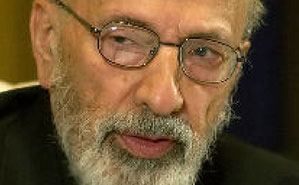
[powerpress]
He tells the stories of growning up in a deformed world and the awakening to the power given at his baptism and the realization our true identity. Our baptism conforms us into Christ, we increase in the Divine Life of Jesus Christ. Jesus dwells with us…transforming us. He shares very special stories of his parents and brothers and sisters. Â The suffering in our hearts, the heart that was made to love, has the power because of Jesus present in us to build the Kingdom of Love. Â Loving and Living with the Heart of Jesus. Â This is a remarkable sharing.
visit Msgr. Esseff’s website Building a Kingdom of Love
Tags: catholic, catholic podcast, catholic prayer, cathollc spirituality, msgr. john esseff
This entry was posted on Sunday, October 2nd, 2011 at 11:06 pm
You can follow any responses to this entry through the RSS 2.0 feed.

My Guardian Dear,
to whom His love commits me here,
ever this day be at my side,
to light and to guard,
to rule and guide.
Amen.
For they are ministering spirits, sent for service, for the sake of those who will inherit salvation†(Heb 1:14)
 O holy Guardian Angel, my dear friend and solicitous guide on the dangerous way of life, to thee be heartfelt thanks for the numberless benefits which have been granted me through thy love and goodness and for the powerful help by which thou hast preserved me from so many dangers and temptations. I beg of thee, let me further experience thy love and thy care. Avert from me all danger, increase in me horror for sin and love for all that is good. Be a counselor and consoler to me in all the affairs of my life, and when my life draws to a close, conduct my soul through the valley of death into the kingdom of eternal peace, so that in eternity we may together praise God and rejoice in His glory. Through Jesus Christ Our Lord.
O holy Guardian Angel, my dear friend and solicitous guide on the dangerous way of life, to thee be heartfelt thanks for the numberless benefits which have been granted me through thy love and goodness and for the powerful help by which thou hast preserved me from so many dangers and temptations. I beg of thee, let me further experience thy love and thy care. Avert from me all danger, increase in me horror for sin and love for all that is good. Be a counselor and consoler to me in all the affairs of my life, and when my life draws to a close, conduct my soul through the valley of death into the kingdom of eternal peace, so that in eternity we may together praise God and rejoice in His glory. Through Jesus Christ Our Lord.
Amen.
O Angel of God, make me worthy of thy tender love, thy celestial companionship and thy never-failing protection!
For He will give His angels charge of you to guard you in all your ways.
On their hands they will bear you up, lest you dash your foot against a stone. (Ps 91)
The Holy Angels, and in particular our Guardian Angels, are such a wonderful gift to us from the Father! Let us give thanks to Him for his generosity and to our Guardian Angel for their presence in our lives!
It’s really important to understand the difference in the angels beyond all the New Age silliness. There are the Holy Angels (we love them and they love us) and the fallen angels (bad, bad, bad)…it’s what discernment and spiritual warfare, on many levels, are all about.
Bruce and I, thanks to Fr. Damien Cook, had the opportunity to speak to Fr. Titus Kieninger of Opus Sanctorum Angelorum about the role of Holy Angels. Be prepared…you’ll have to listen a couple of times to this discussion;  Fr. Titus Kieninger gives so much information about their mission that you’ll need hear a few times to get it all.
[powerpress]
Be sure to visit Opus Sanctorum Angelorum
Let us affectionately love His angels as counselors and defenders appointed by the Father and placed over us. They are faithful; they are prudent; they are powerful; Let us only follow them, let us remain close to them, and in the protection of the God of heaven let us abide. ~ St. Bernard of Clairvaux
Tags: Angel of God, catholic, catholic podcast, catholic prayer, cathollc spirituality, feast of the guardian angels, Fr. Titus Kieninger, Guardian Angel, holy angels, holy guardian angel, Opus Sanctorum Angelorum, ORC
This entry was posted on Sunday, October 2nd, 2011 at 12:33 am
You can follow any responses to this entry through the RSS 2.0 feed.
Heart of Hope Part 3 – What is Redemptive Suffering…using love and the energy of love to redirect pain as an intercessory prayer for another…how it makes sense and is no longer meaningless
[powerpress = “deacon-james-keating”]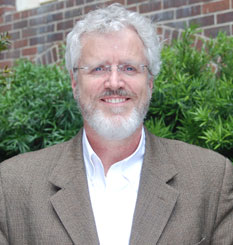
Deacon James Keating, PhD, the director of Theological Formation for the Institute for Priestly Formation, located at Creighton University, in Omaha, is making available to “Discerning Hearts” and all who listen, his series of programs entitled “The Heart of Hope”.
This extraordinarily popular series explores the work of suffering in the Christian life and how God can use it to transform the heart of the individual and the world. 
The “Heart of Hope”  tackles a very tough subject…the gift of suffering in the Christian life. Deacon Keating guides us well.
For more information on the “Institute of Priestly Formation” and for other material available by Deacon Keating, just click here
Don’t forget to pickup a copy of “Communion with Christ” , it is one of the best audio sets on prayer…ever!
Check out Deacon Keating’s “Discerning Heart” page
Tags: catholic, catholic podcast, catholic prayer, cathollc spirituality, communion, discerning heart, hearts, institute for priestly formation, intercessory prayer, james keating, love, redemptive suffering
This entry was posted on Saturday, October 1st, 2011 at 8:00 am
You can follow any responses to this entry through the RSS 2.0 feed.
 “For me, prayer is a surge of the heart; it is a simple look turned toward heaven, it is a cry of recognition and of love, embracing both trial and joy.” – St. Therese of of Lisieux
“For me, prayer is a surge of the heart; it is a simple look turned toward heaven, it is a cry of recognition and of love, embracing both trial and joy.” – St. Therese of of Lisieux
Sometimes words are not full enough to describe someone.
Therese  is a melody.
A melody of grace lofting lyrically around our hearts in prayer;
a sound which invokes joy and sorrow, smiles and tears,
trust, hope and…love.
I’m not a musician, but I know a beautiful song when I hear it.
Her melody is one you wish never would end,
with Therese, “you hear the song”.
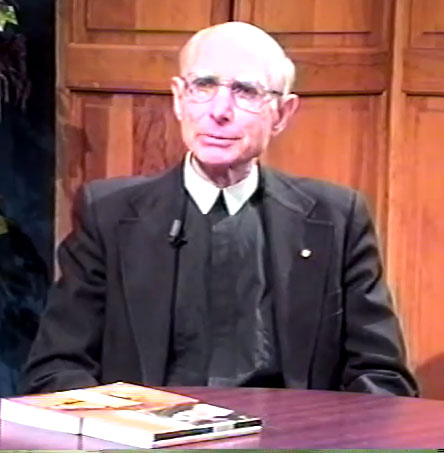 [powerpress]Bruce and I had a chance to speak with Brother Joseph Schmidt about St. Therese. He wrote about her in “Everything is Grace”.
[powerpress]Bruce and I had a chance to speak with Brother Joseph Schmidt about St. Therese. He wrote about her in “Everything is Grace”.
This is my VERY favorite book about St. Therese…it’s wonderful
MY ONLY OCCUPATION IS LOVE
“I do not desire either suffering or death, although both are appealing to me;
it is love alone which really attracts me…
I can ask for nothing with any enthusiasm
except the perfect accomplishment of the Divine Will in my soul,
unhindered by any intrusion of created things.
I can say, with the words of our father, St. John of the Cross,
in his Spiritual Canticle,
‘I drank in the inner cellar of my Beloved, and when I went forth into the meadow
I forgot everything and lost the flock which I used to drive.
My soul has employed all its resources in His service;
now I guard no flock, nor do I have any other duties.
Now my only occupation is love.’
Or again: ‘I know love is so powerful that it can turn
whatever is good or bad in me into profit,
and it can transform my soul into Himself.”
~ St. Thérèse
A MORNING PRAYER WRITTEN BY ST. THERESE
O my God! I offer Thee all my actions of this day for the intentions and for the glory of the Sacred Heart of Jesus. I desire to sanctify every beat of my heart, my every thought, my simplest works, by uniting them to Its infinite merits; and I wish to make reparation for my sins by casting them into the furnace of Its Merciful Love.
O my God! I ask of Thee for myself and for those whom I hold dear, the grace to fulfill perfectly Thy Holy Will, to accept for love of Thee the joys and sorrows of this passing life, so that we may one day be united together in heaven for all Eternity.
Amen.
PRAYER TO ST. THERESE
 O little St. Theresa of the Child Jesus, who during your short life on earth became a mirror of angelic purity, of love strong as death, and of wholehearted abandonment to God, now that you rejoice in the reward of your virtues, cast a glance of pity on me as I leave all things in your hands. Make my troubles your own – speak a word for me to our Lady Immaculate, whose flower of special love you were – to that Queen of heaven “who smiled on you at the dawn of life.” Beg her as the Queen of the heart of Jesus to obtain for me by her powerful intercession, the grace I yearn for so ardently at this moment, and that she join with it a blessing that may strengthen me during life. Defend me at the hour of death, and lead me straight on to a happy eternity.
O little St. Theresa of the Child Jesus, who during your short life on earth became a mirror of angelic purity, of love strong as death, and of wholehearted abandonment to God, now that you rejoice in the reward of your virtues, cast a glance of pity on me as I leave all things in your hands. Make my troubles your own – speak a word for me to our Lady Immaculate, whose flower of special love you were – to that Queen of heaven “who smiled on you at the dawn of life.” Beg her as the Queen of the heart of Jesus to obtain for me by her powerful intercession, the grace I yearn for so ardently at this moment, and that she join with it a blessing that may strengthen me during life. Defend me at the hour of death, and lead me straight on to a happy eternity.
Amen
Tags: catholic, catholic podcast, catholic prayer, cathollc spirituality, heart, joseph schmidt, joy, love, St. therese little flower, st. therese of lieseux, THERESE
This entry was posted on Saturday, October 1st, 2011 at 12:02 am
You can follow any responses to this entry through the RSS 2.0 feed.
Special 6 – Interior Silence
[powerpress]
Interior Silence, in particular in the liturgy, is reflected upon by Deacon Keating.  He leads a meditation during a prayer service with priests, on the letter “Spiritual Formation in the Seminaries”  which calls for spiritual silence to be at the core of seminary formation.  Priests are called to be teachers of prayer and directors of spirituality.  Why silence is so vitally important and what are the blocks  to prevent it…the cynicism that reacts to the ideal. The role of discernment and diminishing interference.  If priests have trouble with this, imagine the challenge for the laity.
Deacon Keating is the Director of Theological Formation for the Institute for Priestly Formation at Creighton University.
Click here for more Deacon James Keating
Tags: catholic, catholic podcast, catholic prayer, cathollc spirituality, silence
This entry was posted on Tuesday, September 27th, 2011 at 9:22 am
You can follow any responses to this entry through the RSS 2.0 feed.





